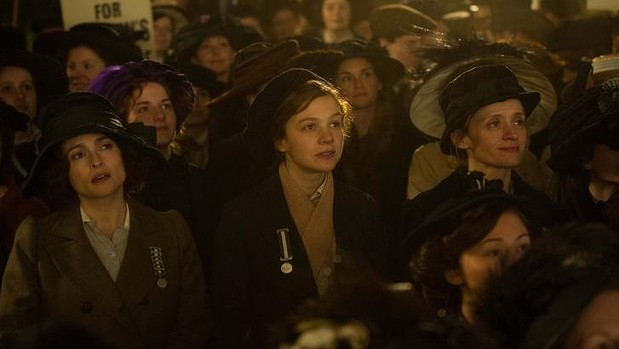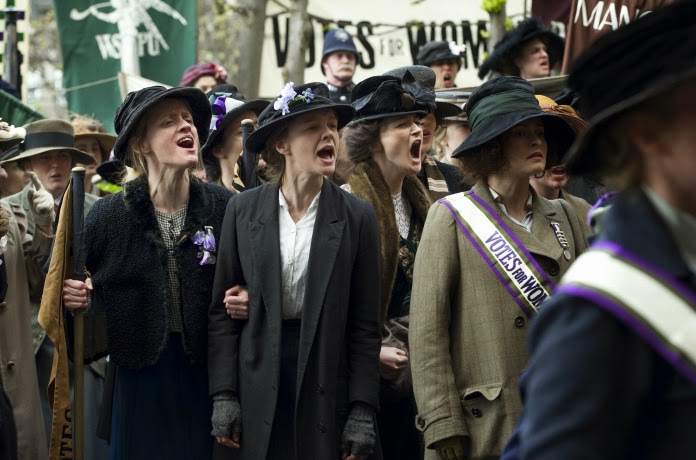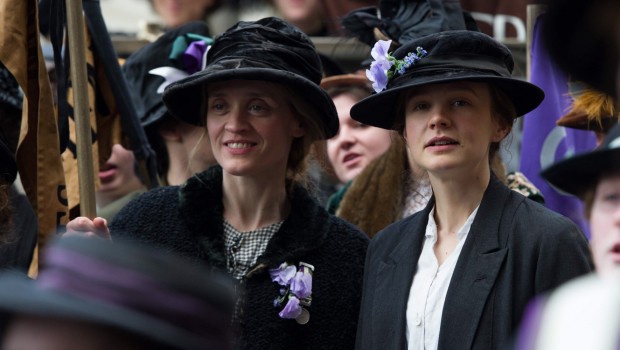Suffragette – Film Review
Reviewed by Damien Straker on the 21st of December 2015
Transmission presents a film by Sarah Gavron
Produced by Alison Owen and Faye Ward
Written by Abi Morgan
Starring Carey Mulligan, Helena Bonham Carter, Anne-Marie Duff, Brendan Gleeson, Ben Whishaw and Meryl Streep
Music by Alexandre Desplat
Cinematography Edu Grau
Edited by Barney Pilling
Rating: M
Running Time: 106 minutes
Release Date: the 26th December 2015
I found Suffragette to be an unexpectedly moving film given the power and conviction of its highly relevant story and the emotional attachment I felt towards its central character. Although it is about the women of England who demanded the right to vote, it is foremost historical fiction that uses make-believe characters to unveil a portion of history. While I was unaware that much of the film was fiction, the actors and the situations were thoroughly convincing to me. Films such as this are caught in an unfair, irresolvable critical bind, lamented for historical inaccuracies when using a real life subject but equally crucified for also taking liberties. Suffragette resolves the creative dilemma simply by developing a believable character, one encompassing a pastiche of experiences of the women of the period and detailing her as an outsider and then an active political figure so that we understand her evolution inside the movement. The leader of the Suffragettes, Emmeline Pankhurst, is kept at arm’s length, which typifies the outside viewpoint but consequently shields the film from accusations of misrepresenting an enormous political figure and allows for a sharp focus point, where one character can become our emotional vessel throughout the story. Its narrative of individuality and personal sacrifice should not be underestimated.
The film was directed by London-born filmmaker Sarah Gavron, who in spite of her minor filmography is well educated in cinema and uncompromising in her approach to the subject matter. Not only has she worked for the BBC and studied directing at the National Film and Television School in London, she also graduated from the University of York with a BA in English and has an MA in film studies from Edinburgh College of Art. For a director who has only made one other feature film and a documentary, she’s assembled a remarkable cast, including Carey Mulligan in the lead role, Ben Whishaw, Helena Bonham Carter and Brendan Gleeson in pivotal supporting parts and a brief, charismatic appearance by Meryl Steep. The star power doesn’t diminish the story’s brutality or overstate the heroics of the film’s protagonist—an impressive feat for the novice writer-director and her co-writer Abi Morgan (the writer of The Iron Lady and the excellent Steve McQueen film Shame). Their partnership should establish a solid platform for Gavron in spite of Hollywood continually turning its back on female directors.

The film’s technical components are where Gavron has imposed her personal imprint. She orchestrates a filmic style that is serious in tone and lacking in sentiment and preachiness. Suffragette is often an ugly film, but its bleakness is an appropriate texture for the early 1900s period and a deliberate aesthetic choice, divorcing the film from overly picturesque or glossy images. The images are desaturated so that the muddy, grey tones become an artistic representation of the mood and feeling of the dispirited people of England living impoverished, repressed and hopeless lives. The cold, wounded atmosphere is captured predominantly using handheld cameras that switch between several shooting modes: close-up shots on the faces, on the shoulder in a medium shot and most energetically in crabbing shots, pacing alongside the actors hurling down the streets. The camera is regularly mobilised and one of the film’s missteps is allowing the camera to lose a sense of spatiality as it constantly probes in search of new images. Some scenes, particularly ones set in a blackened church are also too darkly lit, hampering the visibility. These minor quibbles fail to offset the period details like the costumes and the uncompromised display of the violence—a pivotal story facet Gavron wanted to stress beyond the simplicity of protest signs.

Selective, controlled violence is the essence of the actions and the ideology of this story. In the film, the women rightly argue in “deeds not words” because as a character states, actions and war are all men understand. The film starts in 1912, with Maude (Mulligan) as a bystander, while a protester smashes windows using rocks hidden in a pram as she calls for the right to vote. Maude herself works unhappily in a laundry, ironing and pressing clothes with her husband Sonny (Wishaw, displaying his incredible versatility). They have a son together but it’s a brittle relationship because he’s disinterested in social change and embarrassed by his coworker’s taunts after Maude is arrested. When she asks him what it’d be like if they had a daughter, hoping for empathy, he tells her it would be the very same lifestyle, which underlines his immovability. Maude is also dispirited by her creepy boss, who preys on one of the young girls in the laundry. It is also implied that he may have attacked Maude when she too was young. The context of the character Maude, how she lives, her experiences and values, are relatively ordinary, which is what makes her believable as a character because we can imagine that there were people who lived similar lives and as such, the debate about using a fictional character is largely diluted. Maude is drawn deeper into the suffragette movement, first by speaking in place of a badly beaten woman (Anne-Marie Duff) and then like the other members, including a doctor (Bonham Carter), she starts utilising explosives to disrupt communication lines and draw attention to the cause. There’s a moral compass to their actions too, asking about limitations, such as when they discuss blowing up a government official’s home when it’s empty. Meanwhile, the women are watched over by Inspector Arthur Steed (Gleeson), who organises their photographs in way not dissimilar to how mafia gangs are identified today, highlighting the ludicrousness of the surveillance of the movement.

The way the film carefully builds up to climaxes and unleashes raw emotion is its most striking asset. In perhaps the most painful example, Maude is thrown out of her house and separated from her son. Her son as her motivation is insightful as she is deterring him from growing into a terrible man and consequently, characterising the suffragette movement as influential to the behaviour and attitudes of men as much as women’s rights. After her expulsion, Maude notices Sonny hasn’t been dressing their son properly, as he is still wearing his night shirt. What emerges from this seemingly innocuous detail is blindsiding and deeply affecting. Its power is enhanced by Mulligan’s excellent, sad performance. She is one of the world’s best actresses and determines Maude’s fear and loneliness by her downcast eyes and sunken body language. Another example of the script’s payoffs is with the character Steed, who could have been a one-dimensional adversary. In a crushing scene involving force-feeding, he pleads for the women not to be killed and become martyrs. From this point, his earlier verbal interrogations gain new meaning, suggesting he isn’t entirely hateful or merciless but desperate to sway women away from their deaths. His fears are realised in a devastating peak at a race track, which some might label as predictable. As it unfolded, my feelings were of dread because although I foresaw the brutal action I cared about what was eventuating. At the end of the early preview screening, some understandably applauded the film because it dramatises people who fought to improve the human condition of their daughters and consequently shape the values of their sons. The experiences of these people are evidentially worth reshaping into new stories for the cinema screen given this film’s quality and the way countries still resist the necessity of equal rights. Maybe Suffragette can also remind Hollywood itself that films have another purpose that transcends phrases like “fun” and “a good time”: educating people.
Summary: Its narrative of individuality and personal sacrifice should not be underestimated.







